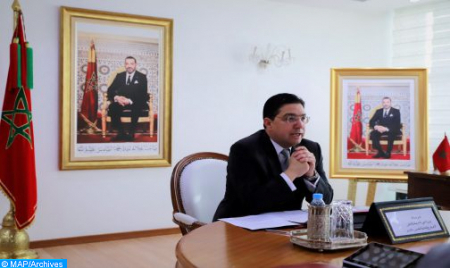FM Underlines Need to Clear Up Misunderstandings in order to Strengthen Africa-Europe Partnership
In order to strengthen the Africa-Europe partnership, it is necessary “to clear up misunderstandings on the migration phenomenon”, said Thursday the minister of Foreign Affairs, African Cooperation and Moroccans Abroad, Nasser Bourita. In an address delivered by videoconference at a high-level meeting on “Migration and Mobility in the Africa-Europe partnership”, organized by the Africa-Europe Foundation ahead of the 6th EU-Africa Summit in Brussels (Feb. 17-18), Mr. Bourita underlined that “if migration is a common issue, the interests linked to it often remain contradictory”. The minister deemed necessary to clear up the misunderstandings on the migration phenomenon so that these interests converge, noting that the first misunderstanding is that of “knowledge”. “Migration policies must resist the examination of the truth instead of giving in to the temptation of controversy. They must, with supporting figures, concede that the crisis is not migratory but political”, explained Mr. Bourita, adding that the second misunderstanding concerns the objective of migration policies. In this regard, the Minister said that we must “stop making people believe that migration policies will one day be able to stop migratory flows”. “Nothing, not even a pandemic, will stop a natural phenomenon that has always existed and will continue to do so,” he pointed out. The third misunderstanding concerns the method, said the official, explaining that we must stop entrusting the keys to migration management to smugglers by closing legal access routes to Europe, in the same way that we must recognize that the scourge is not migration, but the trafficking of migrants, which is, moreover, the third source of profits for criminal organisations. “We must, in short, change our method, that is to say recognize that migration does not need palliative and immediate strategies, but creative and ingenious measures that combine the short, medium and long terms,” he noted during this meeting marked by the participation in particular of the President of Rwanda, Paul Kagame, the Prime Minister of Greece, Kyriakos Mitsotakis, and several leaders and representatives of regional and international organizations. The minister stressed that migration “is not border management”, noting that it is also about the promotion and organization of legal mobility. Migration is not a tool, nor can it be outsourced, he underlined. “Migration management must be part of a cooperation that is not intended to be asymmetrical and one-way,” he added. “We want to make migration the strength and not the Achilles’ heel of the partnership between Europe and Africa”, said the Minister, stressing that “although it is often singled out, Africa fulfills its part”. Migration, he noted, can contribute to the reform of the Africa-Europe partnership, in that it creates human ties, economic complementarities and political cooperation. Bourita also took this opportunity to recall the role of African leader for Migration Issues of HM King Mohammed VI, stressing that the Sovereign is at the origin of the unified African policy on migration contained in the “Agenda for Migration” and the creation of the African Observatory on Migration which was inaugurated on December 18, 2020, in Rabat. Morocco is part of all regional and international debates on migration, the minister pointed out. From the Global Forum on Migration and Development, to the Euro-African Dialogue on Migration and Development (or Rabat Process), to the adoption of the Marrakech Pact, Morocco has always played its role in this area, he said. The Kingdom, he said, has also committed to organizing a meeting of the champion countries of the Marrakech Pact. In this context, and insofar as more than a third of the champion countries are African, the ambition of the Kingdom is to seize this opportunity to make the Marrakech Pact a platform of actions for the Africa-Europe partnership. “We want this issue to be on the agenda of the next EU-Africa Summit,” said Bourita, stressing that “what is at stake in migration management is, in fact, our whole vision on partnership”.

